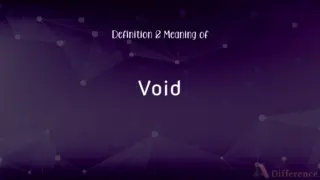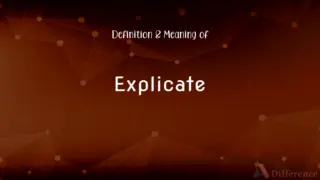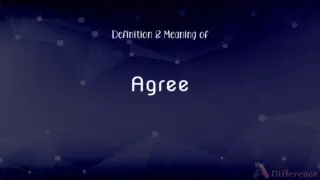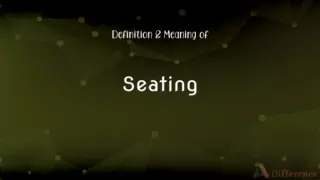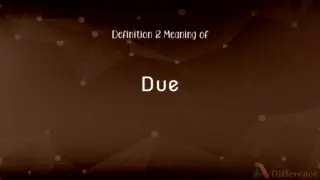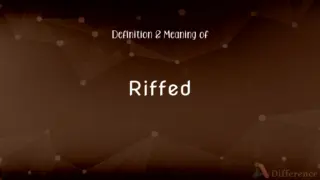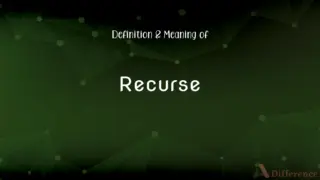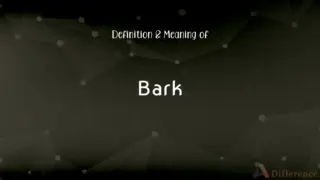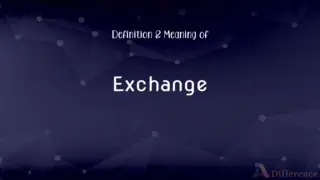Ruin Definition and Meaning
By Tayyaba Rehman & Fiza Rafique — Updated on March 5, 2024
"Ruin" means to destroy or severely damage something, or can refer to the remains of a decayed building or structure. e.g., The fire threatened to ruin the ancient building.
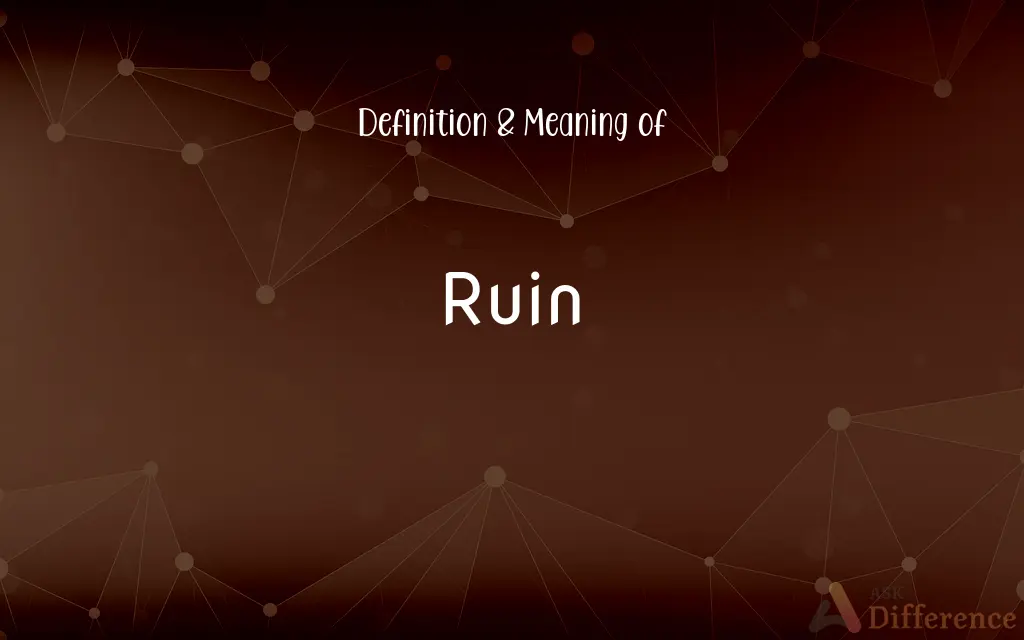
Table of Contents
Ruin Definitions
Ruin refers to reducing to a state of decay.
The mansion fell into ruin over the years.
Ruin can describe spoiling or impairing something.
The storm could ruin our picnic plans.
Ruin denotes a state of disrepair or decay.
The old factory was in a state of ruin.
The state of being physically destroyed, collapsed, or decayed
The castle fell into ruin.
The state of being extensively harmed or damaged
Our vacation plans are in ruins.
Poverty of bankruptcy
Their decision brought the bank to ruin.
Often ruins A destroyed, collapsed, or decayed building or other physical entity
The ruins of the old mill.
One that has been extensively damaged or harmed
He is a ruin of his former self.
A cause of destruction or irreparable harm or loss
Gambling will be his ruin.
To cause (a building, for example) to be in a destroyed, collapsed, or decayed state.
To harm or damage the quality or value of (something) irreparably
A bad diet ruined his health.
To harm or damage the enjoyment or experience of (something) greatly
Ruined the movie by talking throughout it.
Ruined the book by giving away the ending.
To reduce to poverty or bankruptcy
Bad loans ruined the banker.
The remains of a destroyed or dilapidated construction, such as a house or castle.
(uncountable) The state of being a ruin, destroyed or decayed.
The monastery has fallen into ruin.
(uncountable) Something that leads to serious trouble or destruction.
Gambling has been the ruin of many.
The act of ruining something.
(obsolete) A fall or tumble.
A change that destroys or defeats something; destruction; overthrow.
The ruin of a ship or an army;
The ruin of a constitution or a government;
The ruin of health or hopes
(uncountable) Complete financial loss; bankruptcy.
(transitive) To cause the fiscal ruin of; to bankrupt or drive out of business.
With all these purchases, you surely mean to ruin us!
To destroy or make something no longer usable.
He ruined his new white slacks by accidentally spilling oil on them.
To upset or overturn the plans or progress of, or to have a disastrous effect on something.
My car breaking down just as I was on the road ruined my vacation.
To make something less enjoyable or likeable.
I used to love that song, but being assaulted when that song was playing ruined the song for me.
To reveal the ending of (a story); to spoil.
(obsolete) To fall into a state of decay.
To seduce or debauch, and thus harm the social standing of.
The young libertine was notorious for ruining local girls.
The act of falling or tumbling down; fall.
Such a change of anything as destroys it, or entirely defeats its object, or unfits it for use; destruction; overthrow; as, the ruin of a ship or an army; the ruin of a constitution or a government; the ruin of health or hopes.
That which is fallen down and become worthless from injury or decay; as, his mind is a ruin; especially, in the plural, the remains of a destroyed, dilapidated, or desolate house, fortress, city, or the like.
The Veian and the Gabian towers shall fall,And one promiscuous ruin cover all;Nor, after length of years, a stone betrayThe place where once the very ruins lay.
The labor of a day will not build up a virtuous habit on the ruins of an old and vicious character.
The state of being dcayed, or of having become ruined or worthless; as, to be in ruins; to go to ruin.
That which promotes injury, decay, or destruction.
The errors of young men are the ruin of business.
To bring to ruin; to cause to fall to pieces and decay; to make to perish; to bring to destruction; to bring to poverty or bankruptcy; to impair seriously; to damage essentially; to overthrow.
This mortal house I'll ruin.
By thee raised, I ruin all my foes.
The eyes of other people are the eyes that ruin us.
By the fireside there are old men seated,Seeling ruined cities in the ashes.
To fall to ruins; to go to ruin; to become decayed or dilapidated; to perish.
Though he his house of polished marble build,Yet shall it ruin like the moth's frail cell.
If we are idle, and disturb the industrious in their business, we shall ruin the faster.
An irrecoverable state of devastation and destruction;
You have brought ruin on this entire family
A ruined building;
They explored several Roman ruins
The process of becoming dilapidated
An event that results in destruction
Failure that results in a loss of position or reputation
Destruction achieved by wrecking something
Destroy completely; damage irreparably;
You have ruined my car by pouring sugar in the tank!
The tears ruined her make-up
Destroy or cause to fail;
This behavior will ruin your chances of winning the election
Reduce to bankruptcy;
My daughter's fancy wedding is going to break me!
The slump in the financial markets smashed him
Reduce to ruins;
The country lay ruined after the war
Deprive of virginity;
This dirty old man deflowered several young girls in the village
Fall into ruin
Ruin means to cause the downfall or destruction of something.
Neglect could ruin the beautiful garden.
Ruin pertains to financial collapse or bankruptcy.
Bad investments led to his financial ruin.
Ruin is used for the remains of something destroyed.
The castle ruins stood on the hilltop.
Ruin describes causing someone's failure or defeat.
Scandal threatened to ruin his career.
Ruin can mean bringing to a disastrous end.
The project was ruin by poor planning.
Ruin involves causing the loss of reputation.
The accusations could ruin his reputation.
Ruin can refer to the action of destroying.
The invasive species could ruin the ecosystem.
Ruin Snonyms
Dilapidation
The state or process of falling into decay or being in disrepair.
The dilapidation of the property was apparent, with broken windows and a sagging roof.
Decay
The process of declining in quality, power, or vigor.
The old mansion was left to decay after the owners moved away.
Demolition
The action or process of demolishing or being demolished.
The demolition of the old factory made way for new development.
Devastation
Great destruction or damage.
The hurricane left a trail of devastation across the coast.
Wreckage
The remains of something that has been badly damaged or destroyed.
Rescuers searched the wreckage for survivors.
Ravages
Severely damaging or destructive effects.
The ravages of the disease could be seen across the affected regions.
Destruction
The action or process of causing so much damage to something that it no longer exists or cannot be repaired.
The fire led to the complete destruction of the historic building.
Disintegration
The process of losing cohesion or strength; breaking into parts.
The disintegration of the empire was rapid and complete.
Collapse
To fall down or in; give way.
The bridge threatened to collapse under the weight of the traffic.
Desolation
A state of complete emptiness or destruction.
The once vibrant city was reduced to desolation after the war.
Ruin Idioms & Phrases
Ruin the surprise
To spoil or reveal a surprise prematurely.
Don't say anything about the party; it will ruin the surprise.
Ruin the mood
To spoil or negatively affect the general feeling or atmosphere.
Their argument completely ruined the mood at the dinner party.
Financial ruin
A state of having lost all or most of one's money; bankruptcy.
The failed investment led him to financial ruin.
Ruin the fun
To spoil or diminish the enjoyment of an activity or event.
Let's not discuss work now; it will just ruin the fun.
In ruins
Completely destroyed or severely damaged.
After the storm, the small town was left in ruins.
Ruin one’s chances
To spoil or decrease the likelihood of succeeding in something.
Arriving late for the interview might ruin your chances of getting the job.
Ruin the appetite
To spoil one's desire to eat.
Snacking before dinner can ruin your appetite.
Road to ruin
A course of action that leads to disaster or destruction.
His reckless spending put him on the road to ruin.
On the brink of ruin
Very close to complete failure or collapse.
The company was on the brink of ruin before the new CEO turned it around.
Ruin the effect
To spoil or reduce the impact of something.
Adding too much salt will ruin the effect of the other spices in the dish.
Headed for ruin
Moving towards a state of complete failure or destruction.
Without a change in strategy, the project is headed for ruin.
Ruin the image
To damage or spoil the perception or reputation of someone or something.
The scandal ruined the politician's image.
Ruin the experience
To spoil or negatively impact one's enjoyment of an event or activity.
The poor service at the restaurant ruined the experience of a fine meal.
Ruin the landscape
To spoil or mar the natural or aesthetic beauty of a place.
Many believe that the new construction project will ruin the landscape.
Ruin the party
To spoil the enjoyment or success of a social gathering.
The sudden rainstorm ruined the party, which was supposed to be outdoors.
Lay to ruin
To completely destroy or devastate.
The invading army laid the ancient city to ruin.
Ruin the peace
To disturb or destroy a calm or tranquil situation.
Loud construction next door ruined the peace of the quiet neighborhood.
Beyond ruin
In a state of such complete destruction that recovery or repair is impossible.
The neglected house was beyond ruin and had to be demolished.
Ruin the harmony
To disrupt or spoil a state of agreement, balance, or peacefulness.
Their constant arguing ruined the harmony of the family gathering.
Ruin one’s reputation
To cause severe and often irreversible damage to someone's public image.
The scandal threatened to ruin his reputation permanently.
Ruin Example Sentences
He feared that the news would ruin his chances.
A single mistake could ruin the whole experiment.
The old building lay in ruin after the fire.
The flood left many homes in ruin.
The ancient ruins fascinated the tourists.
Time and neglect had brought the house to ruin.
They explored the ruins of the ancient city.
The heavy rain might ruin the outdoor event.
She worried that the scandal would ruin her image.
The castle ruins stood as a reminder of the past.
The leak threatened to ruin the important documents.
The ruins of the temple still showed its past glory.
Overspending led to the company's ruin.
His actions could ruin the team's morale.
The war left the country in economic ruin.
Common Curiosities
How is ruin used in a sentence?
Example: "The ancient castle was now nothing but a ruin."
How many syllables are in ruin?
There are two syllables in "ruin."
How do we divide ruin into syllables?
"Ruin" is divided into syllables as ru-in.
What is a stressed syllable in ruin?
The second syllable, "in," is the stressed syllable in "ruin."
What is the root word of ruin?
The root word of "ruin" is the Latin "ruina."
Why is it called ruin?
"Ruin" is called so from the Old French "ruine" and Latin "ruina," meaning a falling down, a collapse, referring to the state of decay or destruction.
What is the pronunciation of ruin?
Ruin is pronounced as /ˈruːɪn/.
What is the verb form of ruin?
"Ruin" itself is both a noun and a verb; the verb form is "ruin."
What is the first form of ruin?
The first form of "ruin," as a verb, is "ruin."
What is the plural form of ruin?
The plural form of "ruin" as a noun is "ruins."
What is the third form of ruin?
The third form of "ruin" is also "ruined."
What is the singular form of ruin?
The singular form of "ruin" as a noun is "ruin."
Is the ruin term a metaphor?
"Ruin" can be used metaphorically to describe something that has been severely damaged or deteriorated.
Is the word ruin Gerund?
The gerund form of "ruin" is "ruining."
Is the word “ruin” a Direct object or an Indirect object?
When "ruin" is used as a verb, it can have a direct object. As a noun, it can be a direct object itself.
Which determiner is used with ruin?
Determiners such as "the," "a," "this," "those," etc., can be used with "ruin."
Is ruin a vowel or consonant?
"Ruin" is a word, not a vowel or consonant. However, it starts with the consonant 'r'.
What is the second form of ruin?
The second form of "ruin" is "ruined."
What part of speech is ruin?
"Ruin" is both a noun and a verb.
What is the opposite of ruin?
The opposite of "ruin" could be "restore," "repair," or "build."
Is ruin a collective noun?
No, "ruin" is not typically used as a collective noun.
Is the word ruin is imperative?
"Ruin" can be used in the imperative form as a verb, as in "Ruin the plans."
Which vowel is used before ruin?
The choice of vowel before "ruin" depends on the preceding word in a sentence.
What is another term for ruin?
Another term for "ruin" is "destruction" or "decay."
Is ruin an abstract noun?
As a noun, "ruin" can be considered both concrete (referring to physical remains) and abstract (referring to the state of being ruined).
Is ruin a negative or positive word?
"Ruin" generally has a negative connotation, referring to destruction or decay.
Is ruin a countable noun?
As a noun, "ruin" can be countable when referring to physical remains (e.g., "many ruins").
Which preposition is used with ruin?
Prepositions like "of," "in," or "to" can be used with "ruin," depending on the context.
Which conjunction is used with ruin?
Conjunctions such as "and," "but," or "or" can be used with "ruin," depending on the sentence structure.
Which article is used with ruin?
Both "the" and "a" can be used with "ruin," depending on whether it's used in a specific or general context.
Is ruin a noun or adjective?
"Ruin" is primarily a noun, but it can also be used as a verb.
Is ruin an adverb?
No, "ruin" is not an adverb.
Share Your Discovery
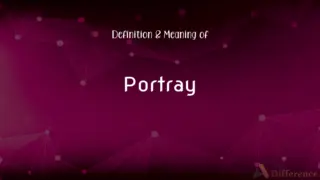
Previous Term
Portray Definition and Meaning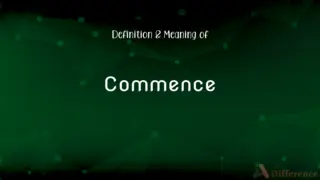
Next Term
Commence Definition and MeaningAuthor Spotlight
Written by
Tayyaba RehmanTayyaba Rehman is a distinguished writer, currently serving as a primary contributor to askdifference.com. As a researcher in semantics and etymology, Tayyaba's passion for the complexity of languages and their distinctions has found a perfect home on the platform. Tayyaba delves into the intricacies of language, distinguishing between commonly confused words and phrases, thereby providing clarity for readers worldwide.
Co-written by
Fiza RafiqueFiza Rafique is a skilled content writer at AskDifference.com, where she meticulously refines and enhances written pieces. Drawing from her vast editorial expertise, Fiza ensures clarity, accuracy, and precision in every article. Passionate about language, she continually seeks to elevate the quality of content for readers worldwide.













